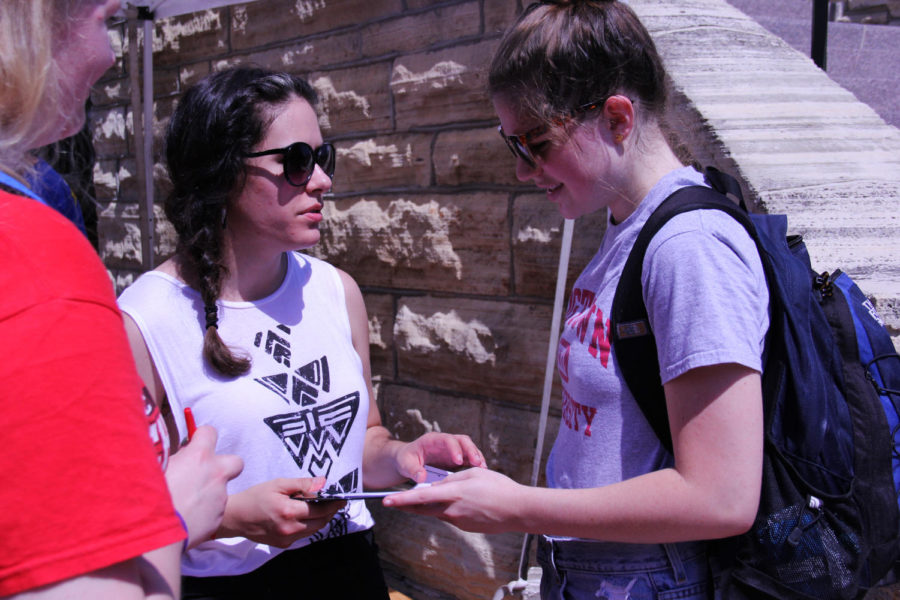Questions raised over intersectionality of the 19th Amendment
Photo: Kelby Wingert/Iowa State
Monica Leier, senior in history, helps Sophie Deam, sophomore in political science, register to vote in Story County. The Carrie Chapman Catt Center for Women and Politics collaborated with the League of Women Voters of Ames to celebrate Women’s Equality Day on Aug. 26, 2013. The holiday celebrates the anniversary of the ratification of the 19th Amendment, granting the women the right to vote.
March 1, 2020
With the kickoff of 19th Amendment and “100 years of suffrage” celebrations around Iowa, there is an ongoing conversation on whether the 19th Amendment is intersectional.
Nancy Gebhart, a graduate student in women and gender studies, said the 19th Amendment was not intersectional at all due to Native American, Asian, African American and other minorities not receiving the vote.
“The 19th Amendment was not an expression of intersectionality because it only granted voting rights to white women,” Gebhart said. “Additionally, much of the rhetoric of the white women suffragists was centered on maintaining white supremacy as an argument for enacting the legislation.”
While the language of the 19th Amendment states, “the right of citizens of the United States to vote shall not be denied or abridged by the United States or by any State on account of sex,” granting all women the right to vote regardless of their race or ethnic background, in many jurisdictions Jim Crow laws and other forms of discrimination prevented nonwhite women from exercising that right.
Karen Kedrowski, director of the Carrie Chapman Catt Center, said suffragettes, specifically Carrie Chapman Catt, didn’t always do what people in the 21st century would do.
“There was of course racism amongst the suffragettes at the time,” Kedrowski said. “Carrie Chapman Catt, who was working very hard to hold together a fracturing national coalition, was trying what she could to help her friends in the South generate any support that they could give.”
Gebhart said she can’t get behind the arguments that “we had to do something.”
“Progress is not progress if you’re stepping on someone to make it,” Gebhart said. “I can’t view that as progress.”
Gebhart said when it comes to intersectionality and the First Amendment, some may find it uncomfortable to critique history.
“I think the controversy exists and persists because white people are uncomfortable talking about race,” Gebhart said. “Not talking about — or thinking about — race is a privilege only afforded to whiteness. The passing of the 19th Amendment was a significant moment in U.S. history and we don’t know how to simultaneously celebrate it and critically reflect on it.”
Kedrowski said she thinks the tough criticism of intersectionality and the women’s movement shows “underlying sexism,” in the way that the suffrage movement had to fight every battle, even when other movements did not.
“What social movement do you know of that addressed every social ill of its time,” Kedrowski said.
Kedrowski didn’t think there was a way to make the movement intersectional in the 1900s.
“There was in fact some discussion of that kind of intersectionality,” Kedrowski said. “Do I think that the country would have accepted it at the time? Probably not.”
Gebhart said a way to make the movement intersectional was to allow other voices of minority women to be heard.
“What would have needed to happen, is that people would have listened and given space to black feminists like Sojourner Truth, [but] because of pervasive racism their voices were just silenced,” Gebhart said. “Their voice didn’t seem as valuable. I think white women were granted the right to vote specifically to maintain white supremacy and reclaim any perceived power loss that white men were interpreting from the civil rights legislation passed during Reconstruction.”







